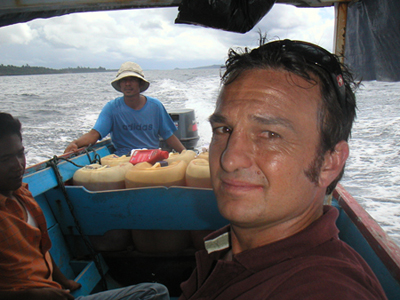For the greater part of three decades three surf companies have dominated professional surfing in terms of event sponsorship money and world titles. Nugable takes a closer look at the situation.
Most sports have Nike and Reebok. Surfing has Quiksilver, Billabong and Rip Curl. Since 1982 only four surfers have won the ASP World Championship without one of the Big 3’s stickers on their board (Barton Lynch/Instinct, Derek Ho/Gotcha, Martin Potter/Gotcha and CJ Hobgood/Globe). Since 1990 it has essentially happened twice.
It leads one to wonder if there’s a conspiracy and whether or not a surfer not sponsored by Rip Curl, Quiksilver or Billabong will ever win a world title again?
“I think the answer is yes,” says veteran Australian journalist Tim Baker. “I don’t think there is a conspiracy. Have a look at event winners over the past few years and there is not a high incidence of surfers winning their own sponsor’s events. It happens here or there, Parko at J-Bay, Mick (Fanning) in Portugal, but not enough to suggest a conspiracy, and there was nothing contentious about those wins. It would be a bit too obvious anyway and I think ASP head judge Perry Hatchett is a man of enormous integrity.”
The last time a surfer not sponsored by the Big 3 won the title was in 2001 when Florida’s CJ Hobgood took home the crown in a season cut short by the tragedy and uncertainty of the events surrounding 9/11.
“I was the last one to do it, but mine doesn’t count,” said former ASP world champion CJ Hobgood. “Look at any sport…golf, tennis, etc. I mean when was the last time a world number one in golf or tennis wasn’t sponsored by Nike or maybe Adidas? (When) you have the most money it’s pretty easy to get the best athletes.”
Looking back, 2002 was the turning point for the ASP when the majority of the events (8/12) main sponsors were one of the Big 3. Since then the Big 3 have essentially controlled the ASP’s World Championship Tour. In 2010 they account for 8 of the 10 events.
An oligarchy is a form of power that effectively rests with a small, elite group of inside individuals. It can be argued that the ASP operates as a corporate oligarchy. Behind the scenes there are always people who complain about surfers getting “pushed” in heats.
Transworld Surf editor-in-chief Chris Cote suggests there is a morsel of truth to that argument. “I don’t think it happens often, but I think the judges, just like the media, get caught up in the hype and push the ‘it’ guys through sometimes.”
Let’s face it, today there are only a handful of surfers with a realistic chance at a title—Kelly Slater, Andy Irons, Mick Fanning, Joel Parkinson, Bede Durbidge and Taj Burrow. All except Durbidge ride for the Big 3. The current number-three in the world was recently picked up by Fox when his primary sponsor, Mada, went belly up.
There is no question the large surf companies do a fantastic job of signing, finding and nurturing talent. Just look at the junior’s scene today. Owen Wright, a 2010 WCT rookie, is a Rip Curl Team rider, as is 16-year-old Brazilian phenom Gabriel Medina.
“The big companies have the resources to get the best guys,” says Cote. “It used to be kids would come up riding for smaller companies, and then get snatched by the bigger companies. Now you see big companies like Target and Nike snatching up kids from the biggest surf companies.”
A perfect example is the recent signing of 9-time NSSA national champ Kolohe Andino by Nike. He bolsters an already impressive lineup of young Nike surfers that includes Dusty Payne, Nat Young, Kai Barger and Michel Bourez. Yesterday, Target also signed the up-and-coming San Clemente teenager. He joins Carissa Moore on team Target and more surfers will surely follow.
Baker suggests subtler forces may also play a role. “Yes, these companies do a good job of picking up the cream of the talent pool, but they also do a really good job of marketing those guys and showcasing their surfing in video and photos, so that we all get a slightly elevated view of their prowess compared to their less-well sponsored peers. If, say, Tom Whittaker was sponsored by one of the Big 3 he would be a lot more visible and we would all be more firmly convinced of how hard he rips. I think this even unconsciously can rub off on the judges at times and get the high-profile guys through tight heats. But I think all concerned know if it became a case of obvious bias pro surfing would quickly lose whatever legitimacy it has.”
If you aspire to be a world champ someday, just to be safe, you’d better make sure you sign on the dotted line with one of these three companies. Or at least until Nike and Target take over.



